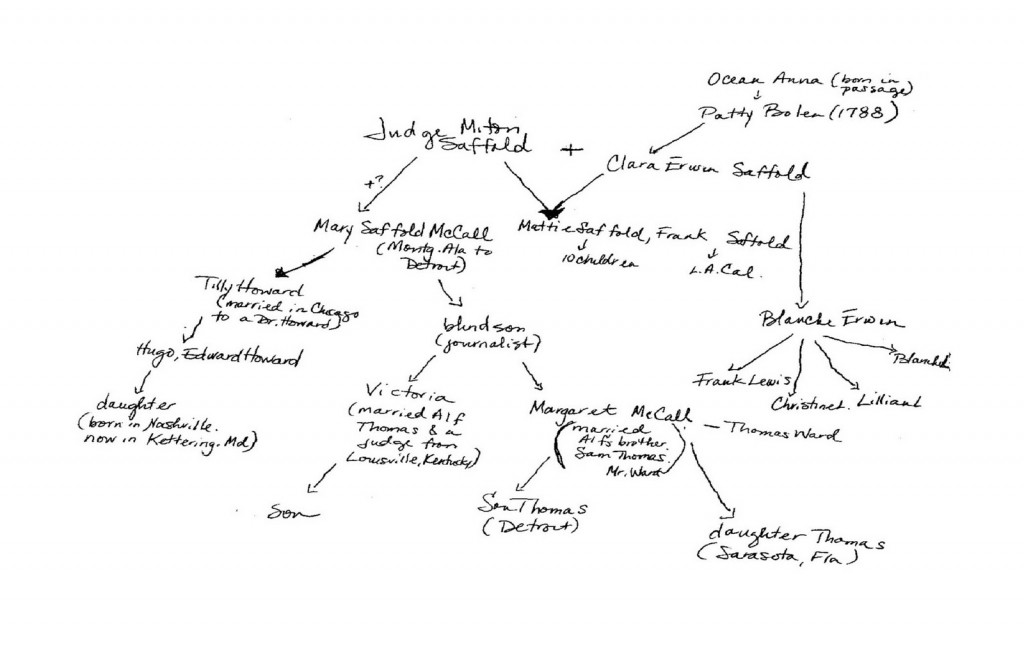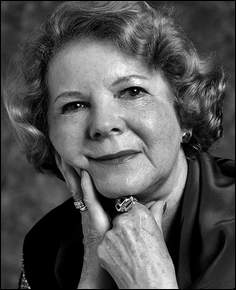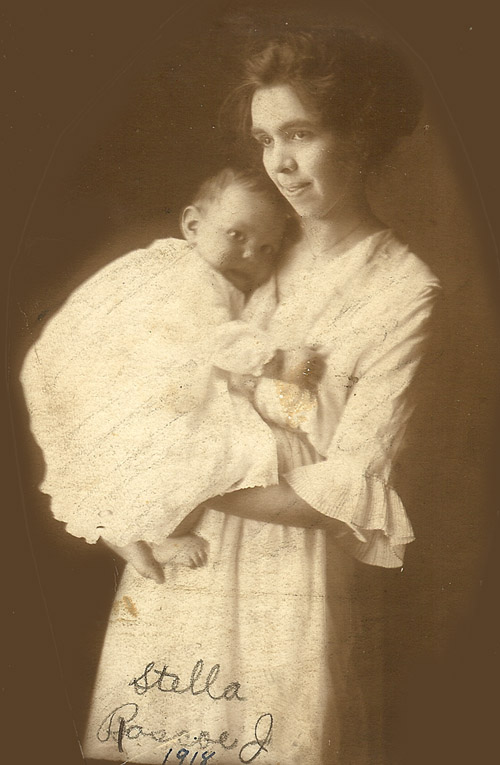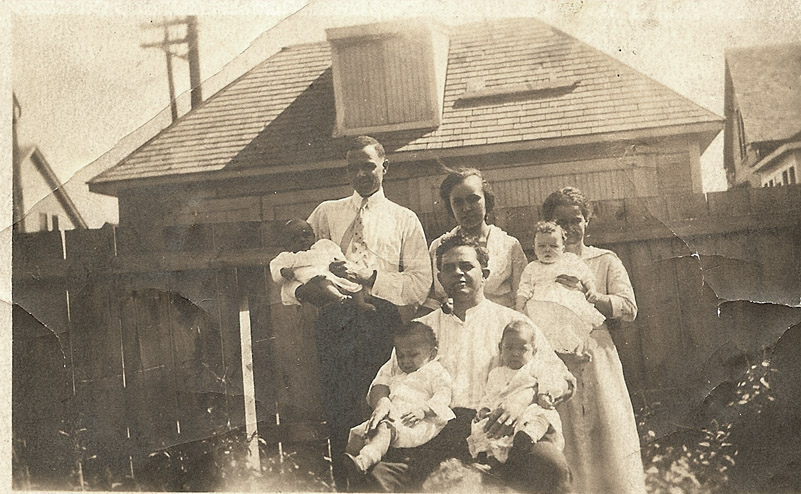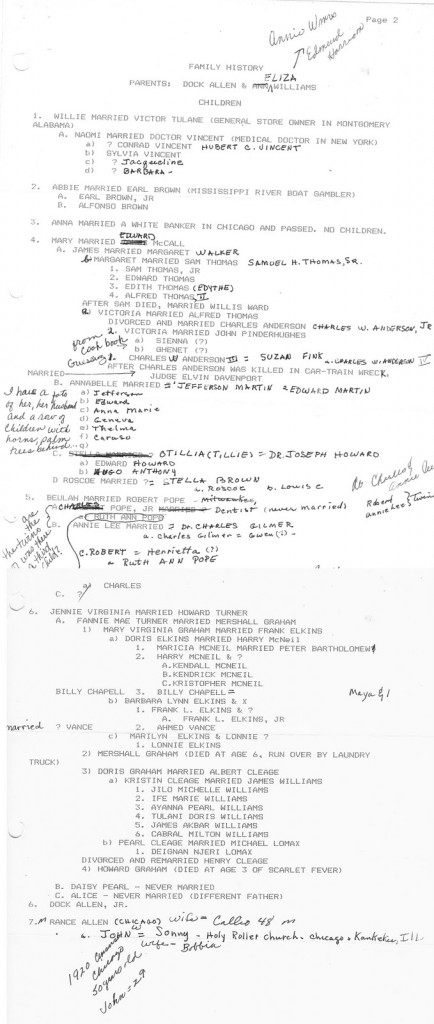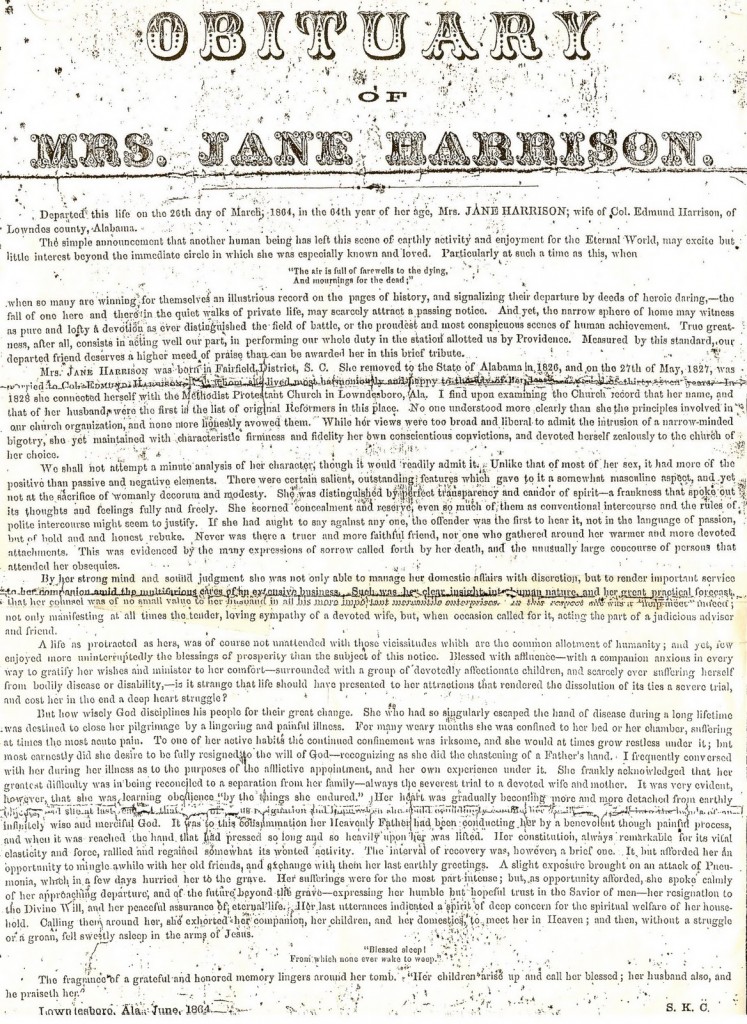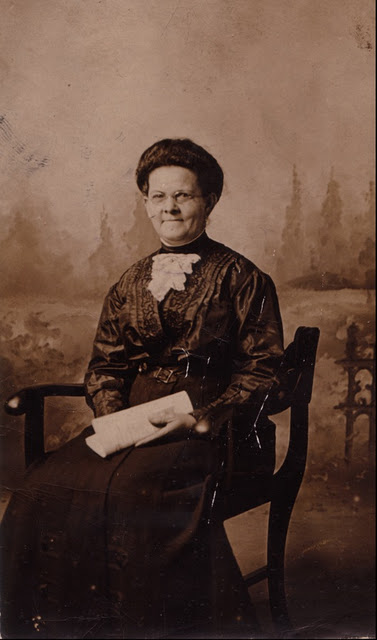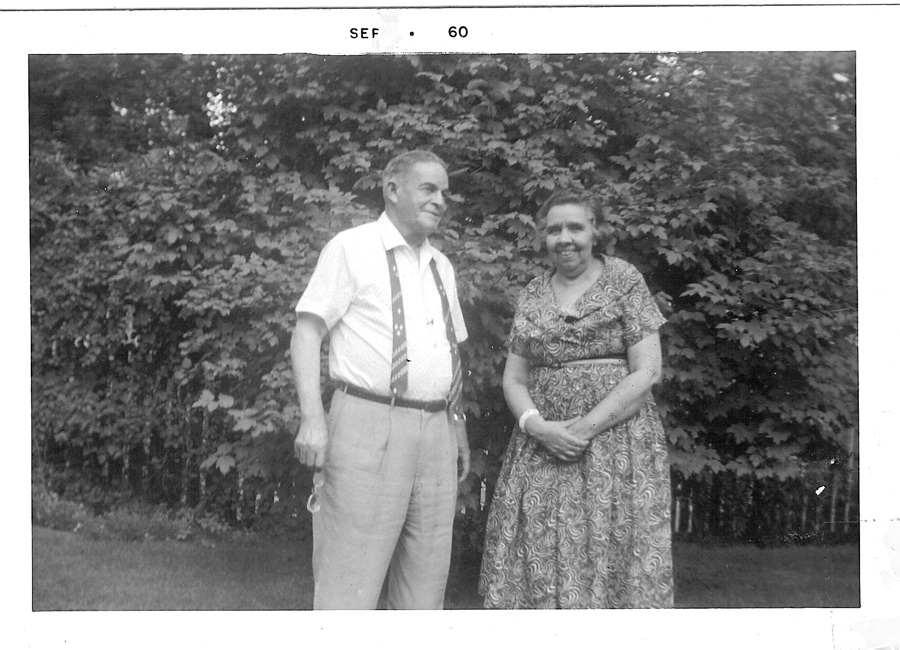
Tag Archives: #Stella McCall
A Transcribed Interview with Stella Brown McCall – Part 1
This is partial transcription of a very long interview that my cousin Margaret McCall made with her Aunt Stella Brown McCall in 1986. Margaret was Mary McCall’s granddaughter. Mary McCall was Eliza Williams Allen and Milton Saffold’s daughter. Stella Brown McCall was married to Margaret’s father’s brother. Margaret’s father was James McCall and his brother was Roscoe McCall. Louise was Stella and Roscoe’s daughter. Joe was Margaret and Stella’s cousin.
Part 1
Margaret: I’m doing family history now and I’m on the McCall side. And I want to learn as much as I can because there are some gaps in things that I have been able to find.
Stella: Well, I don’t know too much about the…
Louise: She doesn’t know about the McCall side because she’s given me all the memories of her side. I have all those you know…
Margaret: On the Brown side?
Stella: Yes.
Louise: Oh yes.
Margaret: But it’s the McCall side I’m interested in.
Louise: Mother you can tell her one thing I remember you told me about the McCall side, you told me that Daddy, that Daddy’s father was a jailor
Stella: He worked at the jail, the Montgomery jail down in Montgomery.
Louise: and they used to have him…he was the whipper and, you know, he was supposed to whip the prisoners, you know the black prisoners. And he would pretend that he was whipping them and you know, make them yell and he would make the whip sound. Isn’t that interesting? I can just picture that.
Stella: Well he had to pose to keep from whipping the prisoners.
Louise: Oh and mother you can also tell her about how Daddy was getting that man out of Montgomery for looking at the white girl. And then they were going to hang him and Daddy had to take him out on that lonely road and get him out of town. And …
Stella: they got stopped on the road.
Louise: The police, the posse, don’t they call it a posse? Or whatever.
Stella: Yes.
Louise: came after him and then when they shined the light on Daddy. They were in a field and they saw that it was Mr., your grandfather McCall’s son and they said “Oh Rossie…”
Stella: Because his father, not cutting you off, Ross’s own, father had worked at the jail and had charge of the colored prisoners. They would have him punish the colored prisoners and he never punished not one. Because he could do it like he wanted to do it. He just posed… Had a whipping place and made the noise like he was whipping them but he didn’t touch a one of them.
Margaret: So this incident of Uncle Ross in the field, what happened?
Stella: They stopped him, right at that field.
Louise: No mother, start with how they were standing outside the drugstore… he and that other one, that Watkins boy and the white girl came by and she told her boyfriend that they had, that this Watkins fellow had winked at her and that started a riot in the city.
Stella: Winked at her.
Margaret: Is that right?
Stella: A riot.
Margaret: Well, how did Uncle Ross get him out of the city?
Stella: Out of the city?
Margaret: You said that they were in the field and the police came and said…
Stella: Now all before this started, Ross had a friend out in the country. This man was a good friend of his and they would go hunting out there. And that’s why he knew the man… his name… I can’t think of his name… what was his name…anyway, well he had a home down in the country and he would go down there every summer you know, just take a week off and hunt and…
Louise: A good place to hide out.
Stella: To hide out. Yes.
Margaret: That’s all?
Stella: And there was a railroad train coming out of Montgomery going on to Atlanta and Ross got this man out of Montgomery and had this porter on this train to stop at this little station down there in the country and nobody would ever think a train would stop there and he stopped just like he got him to do and he put this man on this train in the back and had a place for him to stay and stay shut up and he did that until he got to Atlanta and he was safe.
Margaret: And did he stay in Atlanta or did he leave Atlanta?
Stella: Oh he left Atlanta. We didn’t hear any more of him. But Ross saved his life! They were going to lynch him uh huh, oh yes. Ross had some narrow escapes in that time.
Margaret: He did?
Stella:Yes, because you see this one was taking him for that and that one was taking him for this and it was terrible.
Margaret: Now tell me, you and Uncle Roscoe married in Montgomery?
Stella: Montgomery, yes I married in Montgomery,
Margaret: Where did Uncle Roscoe go to school?
Stella: At State Normal School in Montgomery. And he went to the senior class and some girl got him in trouble and he had to jump out and go and that’s why he didn’t get his papers, you know.
Margaret: How did she get him in trouble?
Stella: Well she was… I guess something was wrong with her…. pregnant. That’s why he had to leave Montgomery. He left Montgomery.
Margaret: And where did he go?
Stella: Where did he go? New York.
Louise: Who are you talking about Daddy?
Stella: And then later he came on down.
Louise: Married you.
Stella: yes came back. Stayed away a long time though. I didn’t hardly…I was his little sister’s dearest friend and I didn’t know anything about him. Nothing. I’d heard of him because he was my brother, he was the age of my oldest brother Scott.
Joe: Was Jeanette your friend?
Louise: Um hum. Jeanette was your friend.
Stella: Jeanette was my best friend all the way from the first grade. And I didn’t know anything about him. I didn’t know there was a brother because he was away. Finished the senior class and everything and gone. Got in trouble and gone.
Margaret: Where did you go to school?
Stella: Same place he did – State.
Margaret: You went to State?
Stella: Yes, same thing. Same school but many years later, you know.
Margaret: Afterwards.
Stella: Now I was Jeanette, his sister’s age, his baby sister. And I didn’t know anything about him (laughs) he came on the scene later. And we were swept away (laughs again. He’d come to the house everyday..
Margaret: Uncle Ross would come to the house everyday, uh?
Stella: Everyday. Every evening. I can see him coming now.(laughs) Well, and that went on so far and we decided to marry.
Margaret: How did you happen to leave Montgomery?
Stella: Oh people were leaving Montgomery like mad at that time.
Margaret: Why?
Stella: There was kind of a thing going then, getting out of the South. That’s when all this uproar started down there. Started changing schools and everything and getting the different things in order for the blacks to go to one school and the whites to another school and they had to fight that and different things and it made an uproar in the city. And then many many of the… all the important families in the city just packed up and said they were going to leave the city and that’s what was happening.
Margaret: When you were going to school, where did you go before Normal?
Stella: One school for me. One school for him. Same school.
Margaret: What was that?
Stella: State.
Margaret: No, but before State Normal for your early education where did you go?
Stella: The only education they had from the cradle to the top floor.
Margaret: Oh, State went all the way.
Stella: Yes, they had buildings on the big grounds and the grammar school buildings were around on the circle ad then the juniors and then the seniors.
Margaret: Now was it integrated then or was it all black or…
Stella: All Black
Margaret:All Black
Stella: All black.
Margaret: Okay, what about the teachers. Who were the teachers?
Stella: White. They started off with all white. Now I remember when I was down in the grades there was one teacher that they had kept, teacher name of Mrs. Foster and she was an excellent first grade teacher. And they kept her. But then later on they started putting the white people in and they’d keep them in, then they’d kick about it and then had to give them recognition you know and finally they got the school like they wanted it and then they… it was a black school. Had it turned black, see, but in the beginning it had all white teachers. Yes because when Ross was there now he graduated, well I’d say, a good eight or ten years before I was in there and he had a teacher that I remember a Mrs. Stuart. She had been teaching there from the beginning and she was there until the end. She was from up North. They brought those teachers down from the north. That’s the way they did. The whole school was white but then finally turned right back because they were fighting it so. They wanted colored teachers in there.
Margaret: Who are they who were fighting?
Stella: The people.
Margaret: The black people?
Stella: Yes, that’s who fought. They had… I can remember the teachers, they were crazy about Ross. He was always such a good friend to them. (laugh) Getting in with everybody. He always was on the good side. Yes, Ross was a sight.
Joe: You remember…one day…he was the first one I ever did see ride a motorcycle.
Louise: That’s right. You know everything.
Stella: Nobody had a motorcycle in the city but Ross.
Louise: You remember that?
Joe: First time I ever remember seeing him.
Margaret: Where was this, Montgomery. He had a motorcycle?
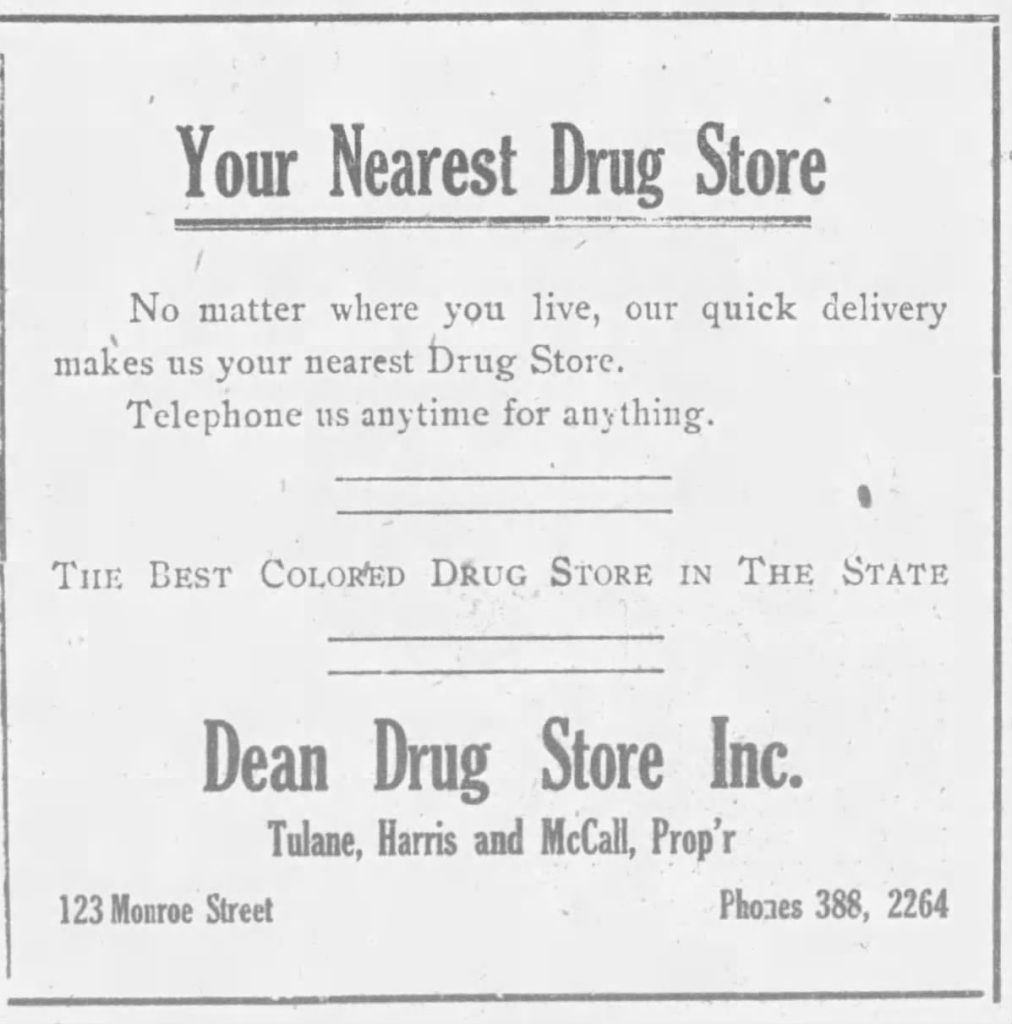
Stella: He used to ride that motorcycle out to my house everyday and ride it back downtown to the drugstore where he was working. They had opened up a drugstore.
Margaret: Who had opened up a drugstore?
Stella:Mr. Tulane, his uncle and they all were working in it It was a nice big, good business and everybody would be so congenial and everything when you would go in. You remember the drugstore? You used to hang out around the drugstore every Sunday. You could find anybody you wanted at the drugstore (laughs) when you’d court.
Eliza’s Story Part 2
In 1992 Margaret wrote back with corrections to my tree.
Dearest Kristin,
I’ve had this buried on my desk too long. So to expedite information transfer, I’ve added to your lineage chart, the corrections I am sure of. I can help you in time with dates (birth and death) I certainly would like to help identify photos and perhaps I could share or exchange some with you. I’m quite happy to have help in unraveling some of the family secrets. Your interest will encourage me to start digging and tracing the Allen’s line again. Doc and Eliza died in Montgomery, Alabama and are buried in Oakwood Cemetery there. I’ll stay in touch with you. Let me know if and when you visit Detroit. Sincerely yours, Margaret
1998 – At this time we lived at the end of a dead-end dirt road in Idlewild, Michigan. We had two large dogs that ran lose in the fenced yard so people did not just walk up on the porch. I looked out of the window one day I noticed two confused looking woman standing in the road. I figured they were looking for someone else and went to see if I could help. One of them turned out to be a friend of my cousin Margaret bringing me a folder full of information from her with a note:
Dear Kristin, your letter asking for information on our mutual family history acted as a stimulant to get me going at research again. I had put my search on hold for (I can’t believe it) almost ten years. Your interest got me going again. I did not write then because I had no further information, but I decided to go to the LDS in Salt Lake City to try to get more information on Edmund and Jane Harrison. I have not been able to establish the connections we are looking for (namely the ownership of Eliza and Dock Allen before 1864. I am enclosing Xerox copies of census records and marriage records on the Harrisons. I’ll share what I can learn as I go along. My hope is that between us we can come up with some answers. I did not learn a lot in Salt Lake City. But I’m on the search trail again. Love, Margaret
P.S. Marion is a long time friend of mine who has done extensive research on family histories. I asked her to contact you and deliver this material since she is visiting Idlewild.
Included in the folder was a copy of the 1870 Census with Dock and Eliza’s household. There was also a list of the large slave holders in Lowndes County in 1860 and a copy of the obituary of Edmund Harrison’s wife, Jane. Wait a minute…. she died surrounded by her loving family? I thought (according to my mother’s story) that she was childless? And I saw they lived not in Virginia but in Alabama, Lowndes County.
Marion proved to be a big help to me, giving me advice and recommending sources of information. One, gave me the names and husbands of Edmund Harrison’s three daughters. Something was off with my mother’s story.
Somewhere in here I got my first genealogical software – family tree maker for mac. In May of 2000 long time family friend Leontine “Teen” Smith died in Detroit. I attended the funeral and met Cousin Margaret face to face for the first time since I was a child. We got together and made plans to do so again. For the next 7 years we shared information, photographs and ideas.
On July 12, 2002 I joined Ancestry.com. Whooo Hooo!! I spent a lot of time at first finding information about Edmund Harrison. I ran into some people researching because they were Harrisons and hoped they had found some slave records, some photos, something. But no, they did not. They had suggestions though. One was to check and see if Jane Harrison had a will. I didn’t think so since she was married.. Another suggestion was that I find the records from the church the Harrisons attended because some of them listed the slaves that attended. I spent months online in 2002 and 2003 trying to find records that would give me proof that Annie and Eliza came from the Harrison’s plantation. To no avail. I also looked for Dock and Eliza Allen in the 1860 census in Montgomery. They weren’t there. I looked in Lowndes County because Edmund Harrison had a large plantation there. I looked for Annie and Eliza Harrison Could find none of them.
In 2003 I sent for and received death certificates for Dock and Eliza Allen, hoping to find the names of their father’s. Nope. Their mother’s names were there but the space for father’s names were empty. Margaret was certain that Edmund Harrison was not Eliza’s father.
Margaret sent me several tapes she made. One was a tape done in 1985 with her uncle Roscoe’s wife, Stella McCall. Roscoe was Aunt Mary’s son. Stella and Margaret discussed life in Montgomery at the turn of the last century….and Mary McCall, Eliza and the other sisters. Partial transcription below.
Margaret: Now, did her mother and father live near where they lived? Did Dock Allen and Eliza…?
Stella: Who? Did who live?
Margaret: The Allens, Mary McCall’s mother and father. Did you ever know them?
Stella: Now Miss McCall’s father was white.
Margaret: Who?
Stella: Miss McCall’s father was white and then her mother married this man that she had. Oh yes he was white. That must have happened way back in, I’d say, near the time of slavery days because she was quite old. Quite old.
Margaret: Who was quite old?
Stella; Miss McCall. Oh yes. I couldn’t guess her age. She was very quiet about it anyway.(laughs)
Margaret: She never talked about her mother and father? And her real father. She only acknowledged this one, the stepfather. But Eliza was her own mother.?
Stella: Who?
Margaret: Eliza Allen, that was her mother?
Stella: Eliza, yes Miss Allen. You know there were five of those girls. Five of them. Miss Willie and Abbie Allen and…
Margaret: Jennie.
Stella: Jennie and … name another one.
Margaret: Willie.
Stella: I named Miss Willie back here. I get confused. There was another…
Margaret: There was Anna.
Stella: Oh, Anna was the one who first made the move to Chicago and when people weren’t even traveling to Chicago. Oh it was a great thing anybody go to Chicago at that time. Ohhh it was a big deal. Well, this Anna, one that was in Chicago, she would come down one time a year and see her mother and they never heard from her because she didn’t write because she had a white husband up there and that’s the way they worked that, but that’s it. (note: she doesn’t appear in Montgomery in the 1900 census)
Margaret: Now you’re saying Mary the oldest one had a different father from the others?
Stella: Now yes, that’s what my mother told me. She said. Oh no, Miss McCall was the top of the bunch. She was as blue eyed as she could be. She had blue eyes and no trace of any darkness. So she was the first child. The other’s now Aunt Jennie she had a different one. You could look at her and tell. And Abbie, the same thing. Willie, oh yes, Miss Willie she had black hair. She was more of an Indian type. I don’t know who her daddy was but they were all different. Back in those days they paid no attention to difference (laughs) That’s right. No, they didn’t. They really didn’t.
Margaret: So you feel, you know, that Mary’s father, was white?
Stella: I don’t feel, I know it (laughs)
Margaret: But you don’t know who?
Stella: I know the people that know about her… yes she’s white. Looks to me like she’s all white. (laughs)
About this time Margaret asked me to look for a connection between Milton Saffold, a lawyer and son of Rueben and Mary (Phillips) Saffold who had a big plantation (Belvoir) in Dallas County and Edmund Harrison. She had received some information that Milton Saffold was her grandmother’s father. Was there a way Saffold could have come in contact with and fathered Margaret’s grandmother Mary?
I started looking on Ancestry.com and the web to see if I could find anything that would tie them together. I found earlier that Milton Saffold married Edmund Harrison’s daughter, Martha. I found Martha with her parents in the 1850 census. I found from the online marriage record that Milton Saffold married Martha in 1851. Mary was born about 1856. I looked for Saffold and Martha in the 1860 census but they were not together. I found Milton with several children and a new wife living with his sister and her family. I couldn’t find Martha at all. I found on Ancestry.com that Milton had married Georgia Whitting in 1857. I assumed Martha was dead.
2003 – In October I received a letter from my sister Pearl. Janis and her mother Sayde Harris had come up to her at a book signing in Maryland and given her a chart showing connections between our family and theirs. They were related, they said, to our cousins Margaret and Victoria through Milton Saffold. I emailed Janis Mercer.
